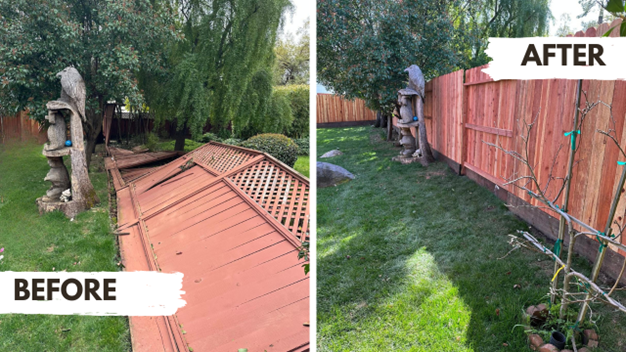Wooden fences are a timeless addition to any property, offering privacy, security, and aesthetic appeal. However, one common issue that plagues wood fence owners is rot. Wood fence boards and pressure treated wood posts are susceptible to rot due to various environmental factors and lack of proper maintenance. In this article, we’ll delve into the reasons behind rotting wood fence and posts. We will also explore effective prevention methods to prolong the lifespan of your fence.
Understanding Wood Rot:
Wood rot is a natural process caused by fungi that break down wood fibers, leading to decay. While all wood types are prone to rot to some extent, certain factors exacerbate the problem, especially in the weather elements that your wooden fence survives in. Understanding these factors is crucial in preventing and mitigating wood fence post rot and helping to elongate the lifespan of your fence.
What Causes a Wood Fence to Rot:
- Moisture: Excessive moisture is the primary culprit behind wood rot. When wood is consistently exposed to moisture, it creates an ideal environment for fungi to thrive and accelerate decay. Rain, sprinkler watering, and ground contact are common sources of moisture for wood fences. What we see the most often is that the moisture is absorbed by dirt that is against the pressure treated wood posts and fence. The dirt retains this moisture and creates the perfect environment for wood rot.
- Lack of Air Circulation: Poor air circulation around the fence boards prevents them from drying properly after exposure to moisture, increasing the likelihood of rot. Dense vegetation and inadequate spacing between the fence and surrounding structures contribute to restricted airflow. The faster your fence is able to dry after a rain storm or morning dew will help increase the lifespan of your fence by reducing the rotting process.
- Insect Infestation: Wood-boring insects such as termites and carpenter ants can weaken wood structures and facilitate rot by creating entry points for moisture and fungi. Infestations of fence and even treated posts often goes unnoticed until significant damage has occurred and the fence starts leaning over or the pickets fall off.
- UV Exposure: Ultraviolet (UV) radiation from sunlight can degrade the surface of wood, making it more susceptible to moisture infiltration and fungal growth. If you live in a hot sunny climate it helps protect your wood fence with stain or paint.
Preventing Wood Fence Rot:
- Choose Rot-Resistant Wood: Opt for naturally decay-resistant wood species such as redwood or cedar for your fence construction. These woods contain natural oils and tannins that deter fungal growth and decay, increasing the longevity of your fence. We recommend installing Redwood over cedar in the Sacramento area because locally we can obtain 3/4 inch thick REDWOOD fence pickets, while the cedar pickets are only 5/8 inches thick. The redwood boards are less susceptible to bowing and twisting because of their extra thickness.
- Apply Protective Finishes: Sealants, stains, and waterproof coatings create a barrier that shields wood fence boards from moisture penetration and UV damage. Regularly apply these finishes according to manufacturer recommendations to maintain their effectiveness. We get questions from customers very commonly about this and after consulting with multiple suppliers we have learned that the best products are oil based. One brand name for wood stain that our suppliers really liked was Penofin.
- Improve Drainage: Ensure proper drainage around your fence and post holes by sloping the ground away from the post and base and installing gravel or drainage pipes where necessary. Adequate drainage prevents water from pooling around the fence posts and minimizes moisture exposure.
- Maintain Vegetation: Trim back vegetation, bushes, and vines near the fence line to promote airflow and reduce moisture retention. Keep grass and weeds trimmed to prevent them from trapping moisture against the fence boards.
- Seal End Grain: Apply wood preservative or sealant to the exposed end grain of fence boards to prevent water absorption and fungal colonization. Focus on areas where cuts or drill holes have been made, as these are vulnerable points for moisture entry.
- Regular Inspection and Maintenance: Routinely inspect your fence for signs of rot, insect damage, or deterioration. Promptly repair or replace damaged boards, loose fasteners, and deteriorating sealants to prevent further degradation.
- Crowning Concrete: Protecting a post by bringing the concrete above the dirt level and curving it to cause water to flow away from the post instead of puddling around it, will extend the life of the fence. This is really important with wooden fence posts, but it also benefits metal posts as well. It is important after the installation for the customer to manage dirt and mulch that is in the area to keep it from building up around the posts. We many times see fences that are buried by 6 inches or more from bark and landscaping that was added over the years and this covers up the crowned concrete making it ineffective and inducing rot.
Wood fence board rot is a common issue that can compromise the structural integrity and aesthetic appeal of your fence. By understanding the underlying causes of rot and implementing effective prevention strategies, you can prolong the lifespan of your wood fence and enjoy its benefits for years to come. Remember to choose rot-resistant wood, apply protective finishes, improve drainage, maintain vegetation, seal end grain, conduct regular inspections, and elevate fence posts to minimize the risk of rot. With proper care and maintenance, your wood fence can withstand the test of time and enhance the beauty of your property.
Contact Us
Wood fences rot is a common issue that can compromise the structural integrity and aesthetic appeal of your fence. By understanding the underlying causes of rot and implementing effective prevention strategies, you can prolong the lifespan of your wood fence and enjoy its benefits for years to come. Contact Fantastic Fence today to embark on the journey towards a beautiful new long lasting fence to frame out your yard. Give Fantastic Fence a call at (916) 790-7100 or send us a message. With a commitment to customer satisfaction and quality products, Fantastic Fence is your trusted fence contractor!

